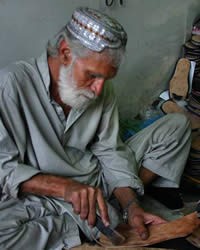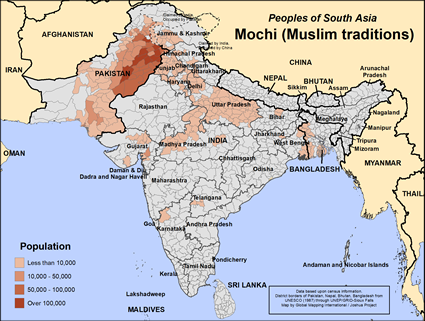Mochi (Muslim traditions) in Pakistan

Photo Source:
Steve Evans - Flickr
Creative Commons
|

Map Source:
People Group data: Omid. Map geography: UNESCO / GMI. Map Design: Joshua Project.
|
| People Name: | Mochi (Muslim traditions) |
| Country: | Pakistan |
| 10/40 Window: | Yes |
| Population: | 3,624,000 |
| World Population: | 3,704,000 |
| Primary Language: | Punjabi, Western |
| Primary Religion: | Islam |
| Christian Adherents: | 0.00 % |
| Evangelicals: | 0.00 % |
| Scripture: | New Testament |
| Ministry Resources: | Yes |
| Jesus Film: | Yes |
| Audio Recordings: | Yes |
| People Cluster: | South Asia Muslim - other |
| Affinity Bloc: | South Asian Peoples |
| Progress Level: |
|
Introduction / History
If you were to purchase any sort of saddle or leather shoes in Pakistan, northern India or Bangladesh, chances are good that it was put together by a Mochi. The name "Mochi" comes from the Sanskrit mochika and the Hindi word Mojna which mean "to fold." While the Chamars would do the initial slaughtering and preparation of the cattle hide, the Mochis are the ones who typically do the finishing work on the leather items.
In Hindu cultures, people are given low status for doing menial or unpleasant work, especially anything having to do with dead animals. In South Asia this attitude spills over to the Muslim peoples. For this reason, the Chamars have very low status. The Mochis are somewhat more respected than the Chamars. There has been a long running competition between the two groups for superiority. However, in some areas the two groups are indistinguishable.
What Are Their Lives Like?
Their customs allow for polygamy, but they do not widely practice it. Sons usually marry at around age 17, while daughters marry sooner. Mochis usually marry off their daughters earlier than Chamars.
What Are Their Beliefs?
Though most Mochi people are Hindu, there are Muslims among them in Pakistan and other parts of South Asia. Most Muslims in that part of the world have allowed Hindu practices to affect their form of Islam.
What Are Their Needs?
Educational standards are quite low for the Mochis. This prevents them from rising above their humble situation and advancing into high paying jobs.
Prayer Points
Pray that the church will begin connecting with Mochi Muslims in Pakistan.
Pray for a harvest of souls among the Mochi Muslims that will last generation after generation.
Pray for spiritual discernment and a desire for truth.